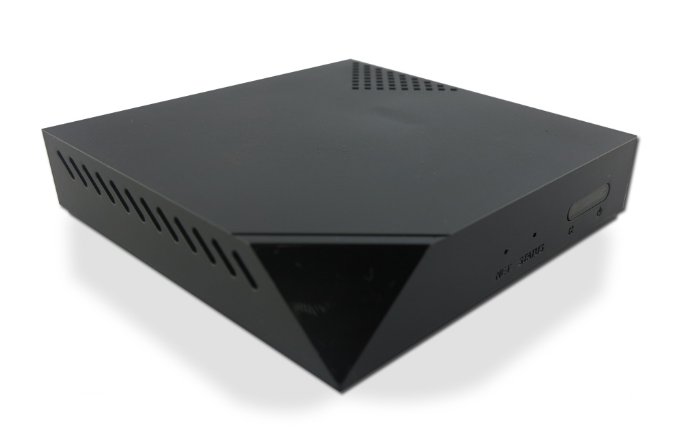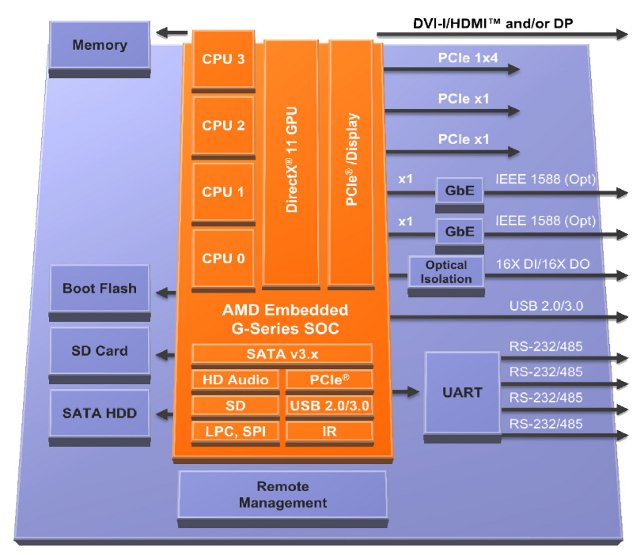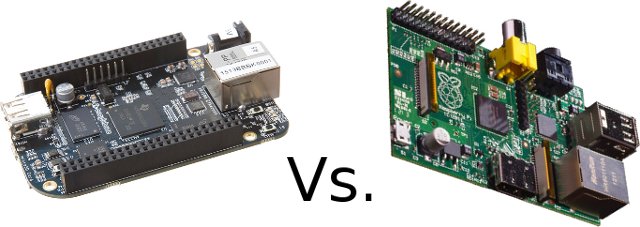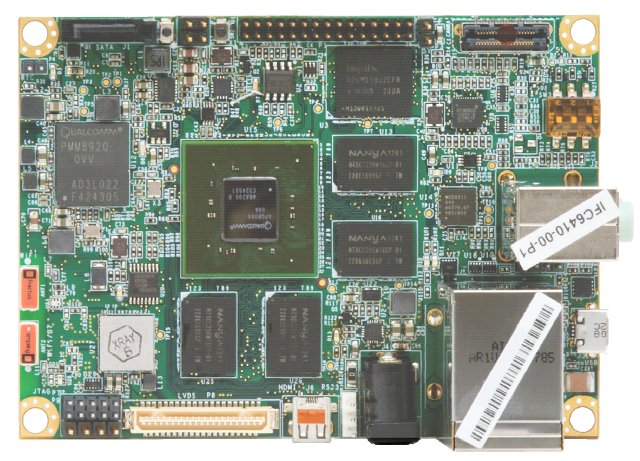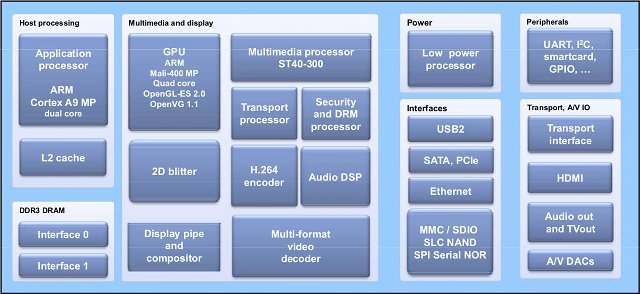Linaro 13.04 has just been released. It features Linux Kernel 3.9-rc7 and Android 4.2.2. A lot of work has been done on ARMv8 (Cortex A53) with further work on OpenEmbedded, more testing, and updates to the GCC toolchain. Calxeda EnergyCore server has been added to LAVA, Origen Quad now gets hardware video acceleration in Android Jelly Bean. Still more cleanup has been done on the kernel side with regards to Samsung and ST SoC, and a big.LITTLE porting guide is now available (linaro login required). Here are the highlights of this release: LAVA Prototype of a new publishing system is used to overcome performance problems with android-build.linaro.org. Calxeda EnergyCore support is merged in LAVA, and an isolated system has been set up for web benchmarking. Fedora support is merged in LAVA. A user can submit LAVA jobs using a Fedora pre-built image. Boot commands are untangled from LAVA dispatcher. They’re now […]
100 Euros “Little Black Box” Runs XBMC Linux
Most set-top boxes running XBMC, are actually Android devices running XBMC as an app, and I don’t know of other media players that are sold with XBMC Linux pre-installed. Until today, as an XBMC Linux STB called The Little Black Box has been officially announced today. This XBMC device is powered by AMLogic AML8726-M3 @ 1 GHz, and comes with 1GB RAM, 4GB Flash, HDMI and AV output and more. Little Black Box hardware specifications: SoC – AMLogic AML8726-M3 ARM Cortex A9 @ 1GHz + Mali-400 GPU System Memory – 1GB RAM Storage – 4GB NAND Flash Video Output – HDMI (1080p) and composite Connectivity – 10/100M Ethernet + 802.11 b/g/n Wi-Fi USB – 2x USB host ports Weight – 500 g Dimensions – 10 x 10 x 3 cm The package will come with the box, a dual sided RF remote with a qwerty keyboard and standard remote buttons […]
AMD Unveils AMD G-Series SoCs For Embedded Applications
In 2011, AMD launched the G-Series APUs (Accelerated Processing Unit) that combines the CPU and GPU into one chipset which then connects to a controller hub to handle I/Os, and recently the company announced AMD G-Series SoC at Design West 2013. The new solution combines a “Jaguar” CPU, a Radeon HD8000 series GPU and a controller hub into one and only SoC, further integrating functions. Both AMD G-Series APU and SoC target embedded systems such as industrial control and automation, digital signage, electronic gaming systems, SMB storage, IP-TV, medical and network appliances, set-top boxes and more. AMD claims G-Series SOCs offer up to 113 percent improved CPU performance compared to G-Series APU, and up to a 125 percent advantage compared to the Intel Atom (Dhyrstone, EEMBC CoreMark). The platform also includes support for DirectX 11.1, OpenGL 4.2x and OpenCL 1.2 yielding up to a 20 percent graphics improvement over G-Series […]
BeagleBone Black vs Raspberry Pi – Features and Price Comparison
The Beagleboard community officially announced the BeagleBone Black and its $45 price tag on the 22nd of April. Many blogs and news sites touted it as a Raspberry Pi killer, and R-Pi vs BBB fanboys fights ensued, and many articles with incorrect information or heavily biased were published. There’s however one decent BeagleBone Black vs Raspberry Pi comparison from a robotic point of view, so I’ll build from there with some corrections and additions. I’ll compare both the features and the price differential between the Raspberry Pi Model B and BeagleBone Black boards depending on use cases. BeagleBone Black vs Raspberry Pi – The Features BeagleBone Black Raspberry Pi Model B Comment Processor TI Sitara AM3359AZCZ100 Cortex A8 @ 1GHz(will be changed to AM3358BZCZ100 in future versions) Broadcom BCM2835 ARM11 @ 700 MHz (Overclockable to 1GHz) Even thoughboth processors can run at the same frequency (after overclocking the R-Pi), but […]
$149 Inforce Computing IFC6410 Board Features Qualcomm APQ8064 Quad Core SoC
I’ve only seen Qualcomm SoC in smartphones and tablets, as well as their own development boards, but Inforce Computing has just changed that thanks to IFC6410 single-board computer powered by Qualcomm Snapdragon S4 Pro APQ8064 quad core krait processor @ 1.7GHz. This Pico-ITX SBC comes with 2GB RAM and 4GB eMMC flash, HDMI out, Gigabit Ethernet, Wi-Fi and more. Here are the specifications of this board: SoC – Qualcomm Snapdragon S4 Pro APQ8064 Quad Core Processor (1.7GHz) + Adreno 320 GPU System Memory – 2GB on-board PCDDR3, up to 533MHz Storage – 4GB eMMC + μSD card connector + SATA interface Connectivity: 802.11 b/g/n WiFi (Atheros QCA6234) Bluetooth 4.0 (Atheros QCA6234) 10/100/1000bps Ethernet (Atheros 8151) Video and Audio Interfaces: μHDMI (1080p) LVDS MIPI-CSI2 (4-lane, up to 20MP camera) HD Audio and Mic-in USB – 2x USB 2.0, 1x USB OTG Misc I/O – 1x I2C, 1x SPI, 1x UART, UIM, […]
STMicro STiH416 Dual Core Media Processor and Linux SDK
STMicro announced STiH416 SoC for media players at CES 2012 with very few details, but we’ve still known that it is a dual core Cortex A9 @ 1.2 GHz coupled with a quad core Mali-400 manufacturer and an hardware video decoder supporting commonly used codecs such as H.264, VC-1, AVS and MPEG2. Yesterday they put out a press release about a STB development platform based on this solution, and I found out we’ve got much more information now. Key features include: ARM Cortex-A9, dual core CPU, SMP NEON SIMD engine yielding up to 6000 DMIPS ARM Mali-400 quad core GPU yielding up to 1600 Mpixels/s fill rate and supporting up to 1080p60 or 1080p30 stereoscopic 3D graphics Dual HD H.264/VC-1/AVS/MPEG2 video decoder or SVC video decode MVC video decode for 3DTV: supports up to 1080p60L/60R, 3D video formats Dual HD internet video decoding: real video 8/9/10, DivX, Xvid, MP4p2, Adobe […]
Booting Linux in Less Than 1 Second in AllWinner A10 Devices? Yes! You Can!
threewater, a Chinese developer, has just posted a very interesting demo on linux-sunxi mailing list showing a device based on AllWinner A10 boot linux within 0.85s, and if you add a Qt app, the total time is just about 1.2s. This appears to be a custom hardware (EM6000), but we do know it’s based on AllWinner A10, comes with 512 MB RAM, and 4GB NAND Flash. On the software side, the device runs kernel 3.4 from linux-sunxi, with a customized version of uboot, a squashfs rootfs, and a Qt 4.7.4 app showing a gauge. Both the rootfs (7MB) and the kernel (2MB) have been compressed with LZO. All that boots from NAND flash for optimal speed. The 1.2 second time includes kernel + rootfs + app time, and the total time is a bit longer, but this is still impressive. Here’s the boot log:
|
1 2 3 4 5 6 7 8 9 10 |
[1.690000 1.690000] U-Boot SPL 2013.01-05984-g2120a27-dirty (Apr 17 2013 - 14:22:02) [0.009000 0.009000] Board: EM6000 [0.012000 0.003000] DRAM: 512MB [1.014000 1.002000] init startup v1.1 [1.016000 0.002000] mount usr data error 2 [1.158000 0.142000] Could not read calibration: "/data/etc/pointercal" [1.166000 0.008000] Couldnt open tslib config file: No such file or directory [1.175000 0.009000] QWSTslibMouseHandlerPrivate: ts_config() failed with error: 'No such file or directory' [1.187000 0.012000] Please check your tslib installation! [1.200000 0.013000] qt show |
If you just boot to […]
How to Detect if an ARM ELF Binary is Hard-float (ARMHF) or Soft-float (ARMEL)
If some cases you may want to know if a library or binary built for the ARM architecture is using hard-float (armhf) or soft-float (armel). You can analyze ELF binary using readefl utility, so let’s have a try. First let’s install some armel and armhf files on a computer running Ubuntu by install gcc/g++ toolchain for armel and armhf:
|
1 |
apt-get install g++-arm-linux-gnueabi g++-arm-linux-gnueabihf |
We now have armhf and armel libraries installed in /usr/arm-linux-gnueabihf/lib and /usr/arm-linux-gnueabi/lib respectively. Let’s check the output of readelf filtered with “FP” string for libm.so.6 for armel:
|
1 2 3 4 5 6 7 |
readelf -a /usr/arm-linux-gnueabi/lib/libm.so.6 | grep FP Tag_FP_arch: VFPv3-D16 Tag_ABI_FP_denormal: Needed Tag_ABI_FP_exceptions: Needed Tag_ABI_FP_number_model: IEEE 754 Tag_ABI_HardFP_use: SP and DP |
and armhf:
|
1 2 3 4 5 6 7 8 |
readelf -a /usr/arm-linux-gnueabihf/lib/libm.so.6 | grep FP Tag_FP_arch: VFPv3-D16 Tag_ABI_FP_denormal: Needed Tag_ABI_FP_exceptions: Needed Tag_ABI_FP_number_model: IEEE 754 Tag_ABI_HardFP_use: SP and DP Tag_ABI_VFP_args: VFP registers |
Great, so there’s an extra line for armhf (Tag_ABI_VFP_args) that seems to confirm the library is hard-float. With readelf compiled from elftoolchain-0.6.1 (source code), the extra line will be a bit different: “Tag_ABI_VFP_args: AAPCS (VFP variant) AAPCS stands for ARM Architecture Procedure Call Standard. You can read more details on ARM website. There are also two other possible values […]



